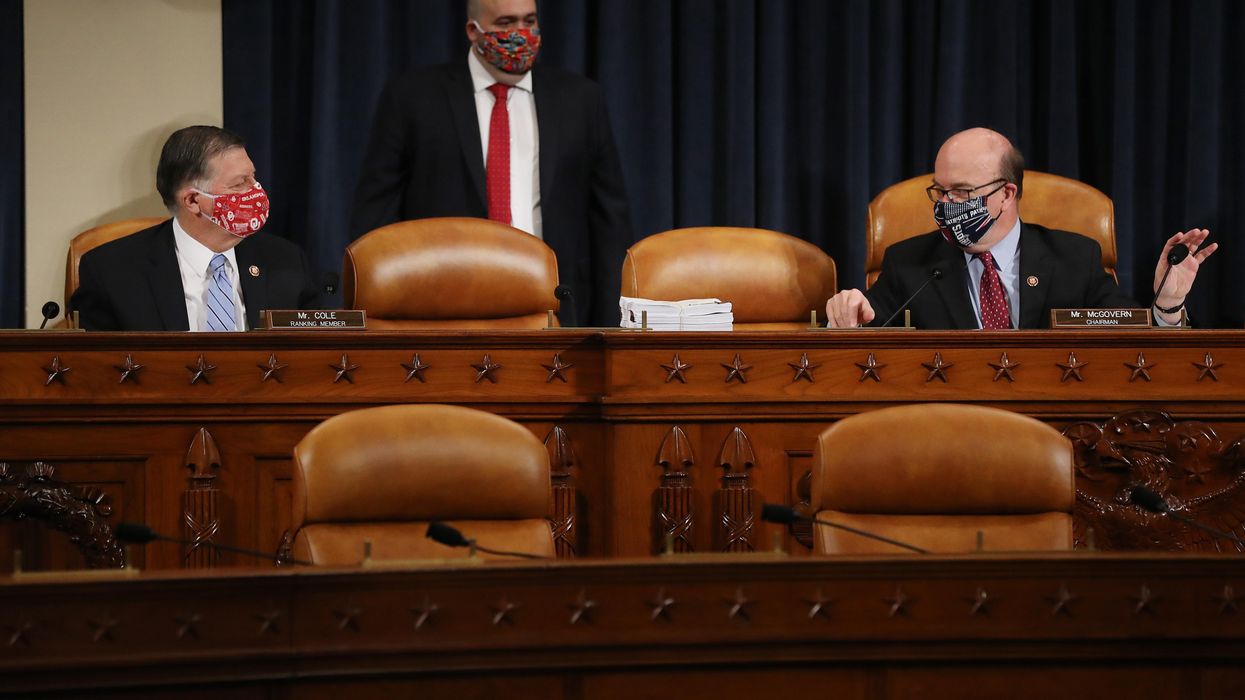Marcum is a fellow at the R Street Institute, a center-right think tank. Deaton is on the communications staff of Protect Democracy, a nonprofit working "to prevent our democracy from declining into a more authoritarian form of government."
Thirteen months ago, we cheerfully reported on a little-covered House Rules Committee hearing that examined ways Congress could "reassert national security authorities it has long lost or delegated to the executive branch." We documented the "bipartisan goodwill" in the room and the seeming "genuine energy for reform."
Despite these good feelings, though, we warned that past optimism has too often been followed by inaction, and so it was up to Congress "to continue this important discussion."
The good news: A year later, we're still optimistic — in fact, even more so than before — thanks to two House committees and a growing bipartisan band of lawmakers interested in restoring Congress' institutional powers.
One day last month, both the Rules Committee and the Foreign Affairs Committee held hearings reexamining Congress' war powers and the broad authorizations to use military power given to previous presidents but still in effect — in one case, almost two decades after being granted.
Before the Rules hearing, Democratic Chairman Jim McGovern of Massachusetts and ranking Republican Tom Cole of Oklahoma released a joint statement explaining why the issue enjoys bipartisan interest. Their committee also highlighted the growing bipartisan consensus that the legislative branch needs to apply greater scrutiny on the executive branch's growing powers and lack of consultation with Congress on its numerous uses of military force.
During the Foreign Affairs hearing, ranking Republican Michael McCaul of Texas, for instance, explained that "wars should not be on autopilot" and "Congress owes our troops a clear commitment to the missions we are asking them to undertake." Democratic Chairman Gregory Meeks of New York similarly observed that an outdated congressional authorization for force "opens the door for future presidents to use force without working through Congress."
After both hearings, the chairmen released a joint statement summarizing the growing consensus that "executive authority on matters of war and peace has gone unchecked for many years" and declaring that Congress has a joint responsibility "when we send our uniformed men and women into harm's way." The chairmen concluded that these hearings would guide Congress' next steps to make "reform a reality."
One immediate reform is to repeal outdated and unnecessary authorizations for the use of military force. The most criticized is the 2002 measure, written to allow President George W. Bush to topple Saddam Hussein's regime, authorizing the president to "defend the national security of the United States against the continuing threat posed by Iraq."
But much has changed in the subsequent 19 years, of course. To begin, the United States is no longer at war with Iraq. Indeed, in the view of the State Department, Iraq is now "a key partner" in the Middle East. Nevertheless, the broad language has been stretched by subsequent presidents of both parties, Democrat Barack Obama and Republican Donald Trump, to support military actions unrelated to ending Saddam Hussein's rule. And finally, as Jack Goldsmith, a high-ranking George W. Bush administration official, explained last month, the law is now "unnecessary" because "every use of force in which the 2002 AUMF was invoked could have been justified independently" — either by the 2001 authorization of force enacted after the Sept. 11 attacks or by the president's commander-in-chief constitutional powers.
Two days after the hearing, Foreign Affairs approved legislation to repeal the 2002 war authorization written by Democrat Barbara Lee of California, who cast the singular "no" vote in Congress against the 2001 use-of-force measure. The legislation enjoys seven Republican cosponsors along with its 105 Democratic backers.
Lee's legislation isn't the only bipartisan bill on this topic moving through Congress. A measure recently introduced by Democrats Abigail Spanberger of Virginia and Jared Golden of Maine, along with Republicans Mike Gallagher of Wisconsin and Peter Meijer of Michigan, would repeal not only the 2002 law but also antiquated authorizations from 1991 (which precipitated the Persian Gulf War) and 1957 (to repel communism in the Middle East). There's also a Senate measure by Democrat Tim Kaine of Virginia and Republican Todd Young of Indiana to repeal both the 2002 and 1991 authorizations.
However, it is important that the effort not stop there. "Congress must do more than withdraw old permission slips and reduce America's heavy military presence abroad," Goldsmith wrote in a New York Times op-ed last month. "It should end its long acquiescence in presidential arrogation of war power by affirmatively prohibiting unilateral uses of force except in tightly defined circumstances of actual self-defense."
In other words, AUMF reform must be partnered with fundamental war powers reform to be effective.
In 2019, a coalition of good government groups articulated key principles for additional reform.
These include the reauthorization or sunset of all AUMFs after two years, a limitation on their scope, strengthened reporting requirements, tightened definitions of relevant terms such as "hostilities" and the cut-off of funds for any violations.
During a long Senate career that included almost four years as Foreign Relations Committee chairman, President Biden was a champion of stronger war powers for the legislative branch and weaker ones for the executive. But, historically, Congress hasn't been willing to take up this cause, while presidents of all ideologies have fought to protect their own expanding power.
Between the recent and widespread action in Congress and Biden's record as a senator, there finally may be the sort of cooperative spirit in Washington necessary to make war powers reform reality. As McGovern told his House Rules hearing, sometimes it is possible to catch "lightning in a bottle" — times such as this one.



















Trump & Hegseth gave Mark Kelly a huge 2028 gift